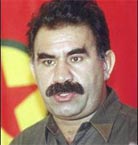Turkey braced on anniversary of PKK leader's capture
 Istanbul/Ankara - Turkish police are on high alert in the predominantly Kurdish-populated south-east, anticipating public demonstrations ahead of the 10th anniversary of the capture of a man few, if any, of the potential protesters will have ever met in person - Kurdish Workers' Party (PKK) leader Abdullah Ocalan.
Istanbul/Ankara - Turkish police are on high alert in the predominantly Kurdish-populated south-east, anticipating public demonstrations ahead of the 10th anniversary of the capture of a man few, if any, of the potential protesters will have ever met in person - Kurdish Workers' Party (PKK) leader Abdullah Ocalan.
With an upsurge in PKK guerrilla activity in the south-east and allegations, strenuously denied by the authorities, that Ocalan has been mistreated in prison, the south-east is on tenterhooks.
After spending his university years as a political activist, Ocalan founded the PKK in the early 1980s and before long the group became a guerrilla force seeking outright independence for the Kurdish south-east.
Since then, more than 35,000 people, Kurdish civilians, Turkish soldiers and PKK fighters have been killed. Today, the PKK says it does not seek independence but further autonomy and cultural rights for the Kurds.
Besides his jailers, just a few people have the opportunity to see Ocalan in the Marmara island prison of Imrali. Along with a handful of relatives, Ocalan's lawyers Irfan Dundar and Ebru Gunay make the trip to the prison in an old punt each week to visit Ocalan for an hour, the only hour of the week in which he is not held in solitary confinement.
"Ocalan is human. He has rights and we try to protect these rights, says Dundar.
The lawyers are not disinterested human rights defenders, however. They also convey Ocalan's thoughts, messages and orders to the outside world and to PKK fighters in the south-east and in northern Iraq.
"The fighters in the mountains say they cannot order a cessation of hostilities without the order from Ocalan," Dundar says.
The lawyers demand that Ocalan be released and that the government engage in peace talks.
How Ocalan ended up behind bars is a twisting tale. After directing the PKK from Damascus, Ocalan was forced to leave Syria in 1998 after Turkey threatened it might invade.
At first he went to Russia and then Greece before arriving in Rome where he was arrested, on an outstanding German warrant. Fearing the reactions of its own sizable Kurdish minority, Germany decided not to pursue Ocalan's extradition.
For a month Ocalan lived in a villa in the suburbs of Rome as Turkey used all of its political muscle to try and get the man who is often referred to in the media as simply "the terrorist leader".
With Turkey having the death penalty at the time, Italy said it was impossible for them to extradite the PKK boss.
As the issue started seriously to hurt Turkish-Italian ties, authorities in Rome ordered Ocalan out of the country.
It is still murky what happened next but on February 15, 1999, Turkish television showed pictures of a disoriented and dishevelled Ocalan on board a Turkish plane flanked by Turkish commandos after having been captured in the Kenyan capital of Nairobi.
Many militant Kurds had wanted Ocalan to use his trial for high treason to highlight the Kurdish problem and to attack the Turkish state, instead he made a call for peace, a call ridiculed by Turkey's main political parties as the begging of a man trying to save his own neck.
His pleadings failed to convince the three judges in the specially convened court on the Imrali island prison. Ocalan was sentenced to death after being found guilty of high treason with the judges deeming him responsible for the deaths of "innocent babies, children, women and old people."
Ocalan's sentence was later reduced to life imprisonment following reforms designed to help Turkey's bid to become a member of the European Union.
Ocalan's imprisonment saw a corresponding reduction in violence in the south-east, some of which can be attributed to Ocalan's calls for peace, some to the increasing effectiveness of the Turkish military's anti-guerrilla fighting strategies.
Despite the government introducing a number of reforms, such as allowing children to be officially registered with Kurdish names, tightening up anti-torture laws, allowing the opening of private Kurdish-language courses and recent moves to open Kurdish language faculties at universities, fighting increased after 2004 with northern Iraq-based PKK guerrillas crossing the border to engage Turkish troops.
The government has continued with its reform programme but human rights groups and the pro-Kurdish Democratic Society Party (DSP) have continued to complain that the reforms do not go far enough and are arbitrarily implemented.
Whilst the government refuses to negotiate with Ocalan, saying it will never deal with terrorists, the DTP argue that what Ocalan is calling for
"What Ocalan is calling for, in regards to the recognition of the Kurdish people and their rights, is exactly what every Kurd across Turkey is calling for," says DTP parliamentarian Nuri Yalman.
Ten years after being captured in Nairobi, Ocalan is still on his own in Imrali prison and police are on high alert, ready to break-up any spontaneous protests calling for his release.
Yalman believes that the solution to the Kurdish problem lies in internal reform, until that happens protests and riots will continue to mark each and every anniversary of Ocalan's capture. (dpa)